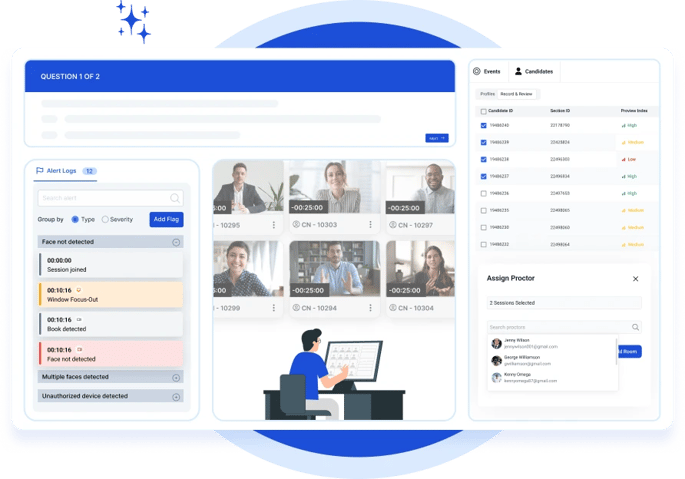Certification exams are critical assessments that evaluate a candidate's knowledge and expertise in a particular field. They help employers and professionals to identify the most qualified individuals who can meet industry standards and perform tasks competently. To maintain the integrity of these exams, proctoring is necessary to prevent cheating and ensure that all candidates have an equal opportunity to showcase their abilities.
In the past, traditional proctoring has been the go-to method for certification exams. However, with technological advancements, online proctoring is now a viable option.
In this article, we will explore the Advantages of Online Proctored Exams over Traditional Proctoring for Certification Exams.
Challenges with Traditional Proctoring
Traditional proctoring, characterized by physical supervision during exams, presents several drawbacks:
- Cost: Traditional proctoring can be expensive, especially if the certification program has many candidates.
- Limited access: Accessibility is restricted, particularly for candidates in remote areas, due to the requirement of physical presence.
- Inconvenient scheduling: Scheduling exams at specific physical locations and times can pose challenges, especially for candidates with busy schedules or those residing far away.
- Reduced Security: Traditional proctoring methods may have limitations in ensuring exam security, as human proctors can't monitor every candidate simultaneously, increasing the risk of cheating or misconduct.
What are Online Proctored Exams & How does it work?
Online proctored exams represent a modern approach to invigilating certification exams, leveraging cutting-edge technology to monitor candidates from a distance. Unlike traditional pen and paper exams, where candidates are physically supervised by invigilators in a controlled environment, remote proctoring allows candidates to take exams from the comfort of their own space, while still ensuring exam integrity.
Remote Proctoring Software supports various key features including AI-Powered remote proctoring, Live proctoring, Secondary camera proctoring & Secure Browser capabilities.
Why Should One Consider Online Proctored Exams over Traditional Proctoring Methods?
To choose the best proctoring method for certification exams, it is essential to compare the two methods. Here are some factors to consider:
1. Cost-effectiveness
Online proctoring can be a cost-effective option for certification exams. With traditional proctoring, the cost of hiring a proctor, renting a location, and providing physical exam materials can add up quickly. Online proctoring eliminates many of these costs, as everything can be done remotely.
2. Flexibility
Online proctoring offers greater flexibility in terms of scheduling and availability. With traditional proctoring, you are limited to specific dates, times, and locations for exams. Online proctoring allows for more scheduling options, as the exam can be taken from anywhere with a reliable internet connection.
3. Reduced Environmental Impact
In-person testing requires the use of physical exam materials such as paper, pencils, and scantron sheets. Online proctoring eliminates the need for these materials, reducing the environmental impact of certification exams.
In addition, online proctoring eliminates the need for travel to a testing center, which can reduce carbon emissions and contribute to a more sustainable future.
4. Enhanced Security
Online proctoring uses advanced technology to enhance security measures and prevent cheating. Remote proctors monitor exam-takers in real-time through video and audio feeds, and artificial intelligence is used to detect suspicious behavior.
Additionally, many online proctoring platforms use biometric authentication to verify the identity of the test-taker before and during the exam.
Traditional proctoring relies heavily on the vigilance of the proctor to prevent cheating, but online proctoring offers a more robust and reliable solution.
Using Talview Proctoring to Scale your Certification Program
As we have seen, online proctoring has numerous advantages over traditional proctoring methods, and it is clear that it is becoming the preferred option for certification exams. But how can you make sure your online certification exams are secure and reliable? That's where Talview's Proctoring Solution comes in.
Platform offers an AI-powered approach to secure and scale certification programs. Features include:
- AI Monitoring: AI algorithms detect suspicious activities, ensuring exam authenticity.
- Flexible Options: Live, automated, and hybrid proctoring options cater to diverse needs.
- Cost-effectiveness: By eliminating the need for physical infrastructure and human resources, Talview's solution reduces overall costs.
- Efficiency: Streamlined processes enhance efficiency and scalability.
- Best-in-Class Support: Our platform providers offer prompt assistance and guidance, ensuring a smooth and hassle-free exam experience for all Test Takers.
Overall, the platform also facilitate communication between candidates and proctors during Live proctored exams. It enables seamless interaction, allowing candidates to seek clarification or assistance as needed, ensuring a supportive environment throughout the exam.
Conclusion
Online proctoring has become increasingly popular in recent years due to its convenience, accessibility, cost-effectiveness, flexibility, reduced environmental impact, and enhanced security. As technology continues to advance, it is likely that online proctoring will become an even more viable and attractive option for organizations looking to administer certification exams in a secure and efficient manner.
Ready to enhance your certification exams with Talview proctoring? Contact Us today to discover how our innovative solutions can elevate your certification process and ensure exam integrity.








Leave a Reply